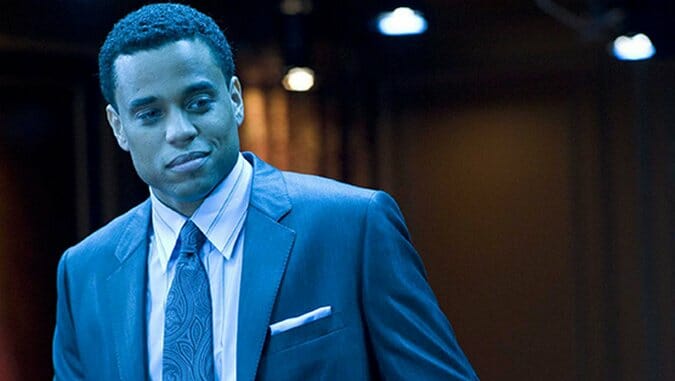The Perfect Guy

The Perfect Guy is pitch-perfect Hollywood entertainment of the kind that studios used to crank out by the dozens in the 1940s. Back then it would have starred Bette Davis or Joan Crawford or Barbara Stanwyck in the female lead, and the sociopathic, eponymous person of the title would have been Cary Grant, or maybe Humphrey Bogart if the filmmakers wanted to go a little darker. This time out we’ve got Sanaa Lathan and Michael Ealy, with Morris Chestnut in the third lead (the Claude Rains or Ralph Bellamy role, if Claude Rains and Ralph Bellamy had been built like an Adonis). It’s a testament to the charisma and talent of these actors, as well as to the supremely confident craft of director David M. Rosenthal and screenwriter Tyger Williams, that they not only invite but earn comparison with the great films noir of years past. Smart, scary and funny, The Perfect Guy is one of the most relentlessly entertaining movies of 2015.
I use the word “relentless” purposefully, because one of the film’s greatest assets is its absolutely ruthless pace, its premise riffing on movies like Fatal Attraction and Play Misty For Me with the genders reversed. Successful single woman Leah (Lathan) breaks up with her boyfriend Dave (Chesnut) when he refuses to commit, then finds herself getting more than she bargained for when she begins dating Carter (Michael Ealy), a guy who seems too good to be true—and of course is. After sweeping Leah off her feet, Carter reveals himself to be a flat-out whack job, and when Leah tries to break things off, she realizes just how diabolical he can be when it comes to making her life hell.
This idea isn’t exactly new—it’s the stuff of dozens of Lifetime “woman in jeopardy” movies—but the artistry of the execution elevates it to something truly special. Rather than run from the familiarity of the premise, Rosenthal and Williams brilliantly take advantage of it, knowing that we’ve already figured out where a movie like this will go, so they don’t waste time in the opening scenes on stuff we don’t need. Instead, they ramp up the tension early on and never let up, flexing a kind of innate knowledge of where to take shortcuts and where to linger, setting up a rhythm of suspense that yields both genuine thrills and nasty laughs. And when The Perfect Guy allows the audience to get ahead a little bit, it’s always so that Rosenthal and Williams can yank our expectations out from under us gleefully.
The tight pace also allows Rosenthal to turn the film into a kind of compendium of what has worked in all the best stalker movies before this; there are echoes of not only Fatal Attraction and Misty, of course, but of Single White Female, Fear, Cape Fear and so many others. Paul Schrader once said that Hollywood was in the “old wine, new bottle” business, and Rosenthal strikes exactly the right balance here. His is a thankfully subtle style, too: In scene after scene Rosenthal employs design elements that accelerate the tension without calling attention to themselves, using the nooks and crannies of his widescreen aspect ratio to constantly set the audience on edge. This is his fifth feature but his first studio film, and it’s clear that Rosenthal was more than ready for the increased resources available to him—his use of architecture, color and light to convey theme and character, and to manipulate the audience’s emotions, is exquisite.
-

-

-

-

-

-

-

-

-

-

-

-

-

-

-

-

-

-

-

-

-

-

-

-

-

-

-

-

-

-

-

-

-

-

-

-

-

-

-

-








































